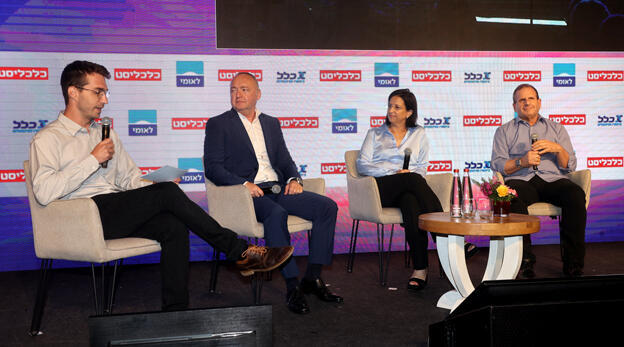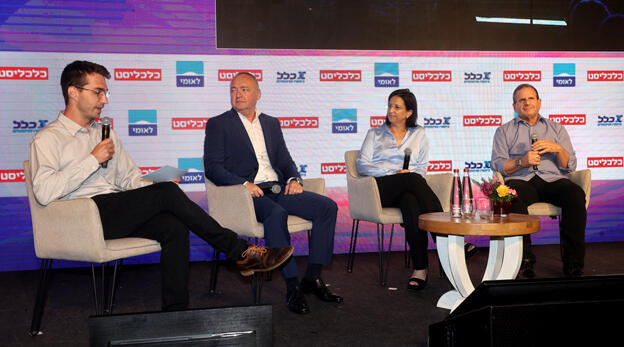
National Economic Conference
"The state needs strategic facilities under its control so that they continue to operate even in war"
Ashdod Port Chairman Shaul Schneider was speaking at the National Economic Conference of Calcalist and Bank Leumi. Liat Shuv, Head of Corporate Banking at Bank Leumi: "There is no fear that the state will not be able to finance national infrastructure projects."
"Under any scenario, water will continue to flow to homes in Israel during the war, even if it will be on a smaller scale," said Mekorot Deputy CEO Daniel Soffer at the National Economic Conference of Calcalist and Bank Leumi.
Soffer was speaking on a panel that dealt with national infrastructures and was moderated by Calcalist reporter Yuval Sade. Also participating in the panel were the chairman of Ashdod Port Shaul Schneider, and Head of Corporate Banking at Bank Leumi, Liat Shuv.
1 View gallery


Economic Conference panel (from left): Hagai Gilboa, Shaul Schnieder, Liat Shuv, Dani Soffer
(Photo: Yariv Katz)
According to Soffer, "We are built on several layers of water sources, and in an emergency we build on our underground water reservoirs and the Sea of Galilee. This source is very wide, and there are many wells scattered over large areas, something like 1,000, which would be very difficult to damage at the same time. The state saw water as a strategic resource, and desalination facilities were set up to protect this resource so that it would always be available and certainly in times of emergency. We have hundreds of generators from the northern border to Eilat that know how to supply the water to anyone who needs it."
Shaul Schneider, the port of Ashdod is the last government port, and during the war it serves almost as a government arm. What drives you as a government company, the business or the national interest?
Schneider: "We are government-owned and this imposes an obligation on us to serve the Israeli economy even during a time of intense war, and we did so. The port did not stop working for a moment on October 7 and continues today. Even when we suffered from the fact that 100 of our employees were called to the IDF reserves and from the fact that dozens of our employees are from the Gaza border area. The port of Ashdod is one of the strategic facilities in the country. We also provide the security system with a double-digit number of vessels and other factors. At the same time, our commercial activity continues as normal. If in the fourth quarter of 2023 our revenues were NIS 205 million, in the first quarter they increased to NIS 249 million. Our income level is rising because we have to finance ourselves and continue to pay salaries."
Liat Shuv, Israel's risk premium is rising and some foreign companies are afraid to come here. As a bank that finances infrastructure projects in Israel, is it more difficult to obtain financing?
"After more than 9 months of war, we are in a challenging reality and there is no doubt that it is not easy for the economy, but nevertheless the economy is entering this period in a strong way. National infrastructure projects are a need that connects to the common goal of the state and the private entrepreneurs, and therefore there is a great desire to make these projects a success. We think these are projects that are important to finance, and there is no reason for them to be reduced."
Is there a fear that the government will not be able to finance these projects?
Shuv: "No. There is a common goal here for both the state and individual entrepreneurs. The economy will not be able to continue developing without these projects, so there is no doubt that they will continue."
Soffer, you also operate in other countries and supply water to Jordan and the Palestinian Authority as well. Did October 7 have an impact on this issue? Do you see a reluctance to work with you among foreign entities?
"On October 7, there was stagnation, but since the beginning of the year, not only do we not see a stop, but even an increase in the requests that come to us, mainly to provide advice and technology. We plan to increase the amount of water both to Jordan and to the Palestinian Authority. In this regard, business is as usual and it is good that it is so."
Shaul Schneider, in the basic guidelines of the government it is written that action should be taken to privatize the port of Ashdod, but this plan is not really promoted, and you are promoting an offering of the company's shares. Isn’t this evading a solution to the basic problem of the port, which is the fact that it is government-managed instead of being privately-managed?
"First of all, we operate as a business company. We operate according to all the accounting rules because we see ourselves as a business entity. It is true that we have weights on us such as collective labor agreements that make it difficult for us, but after October 7, looking ahead, it is clear that the state needs strategic facilities under its control that will continue to operate even in a state of war."
Liat Shuv, do you think the state is doing enough regarding infrastructure? Do you have enough to invest in?
"The state can do more, and it is very important to continue doing so. It is very important that bureaucracy be shortened because in the end we need it for growth with the increase in the population. I think that transferring as many projects as possible to private entrepreneurs is the right way to promote them".
How will each of you make sure that the infrastructures in Israel are in a better state 5-10 years ahead?
Soffer: "We are doing a lot when it comes to bringing water for agriculture to the Western Negev. This is something that the country stressed during the war. I very much hope that we see growth and prosperity of the Western Negev with strong infrastructures that will bring a lot of water. In addition, some of our infrastructures will be protected differently in the near future."
Schneider: "A few weeks ago we completed the construction of our flagship platform, Platform 21, in which NIS 2 billion was invested. We invest NIS 300 million every year in renewing the infrastructure, and beyond that we invest in innovation and start-ups. The infrastructure is a locomotive that helps the economy grow."
Shuv: "In the coming decade we will see a big change in infrastructure in Israel and as a financing entity we really want to finance these infrastructures. We think it is our duty to set the wheels of the economy in motion and implement them, and it is very important that the tenders be issued on time. We will be there."














